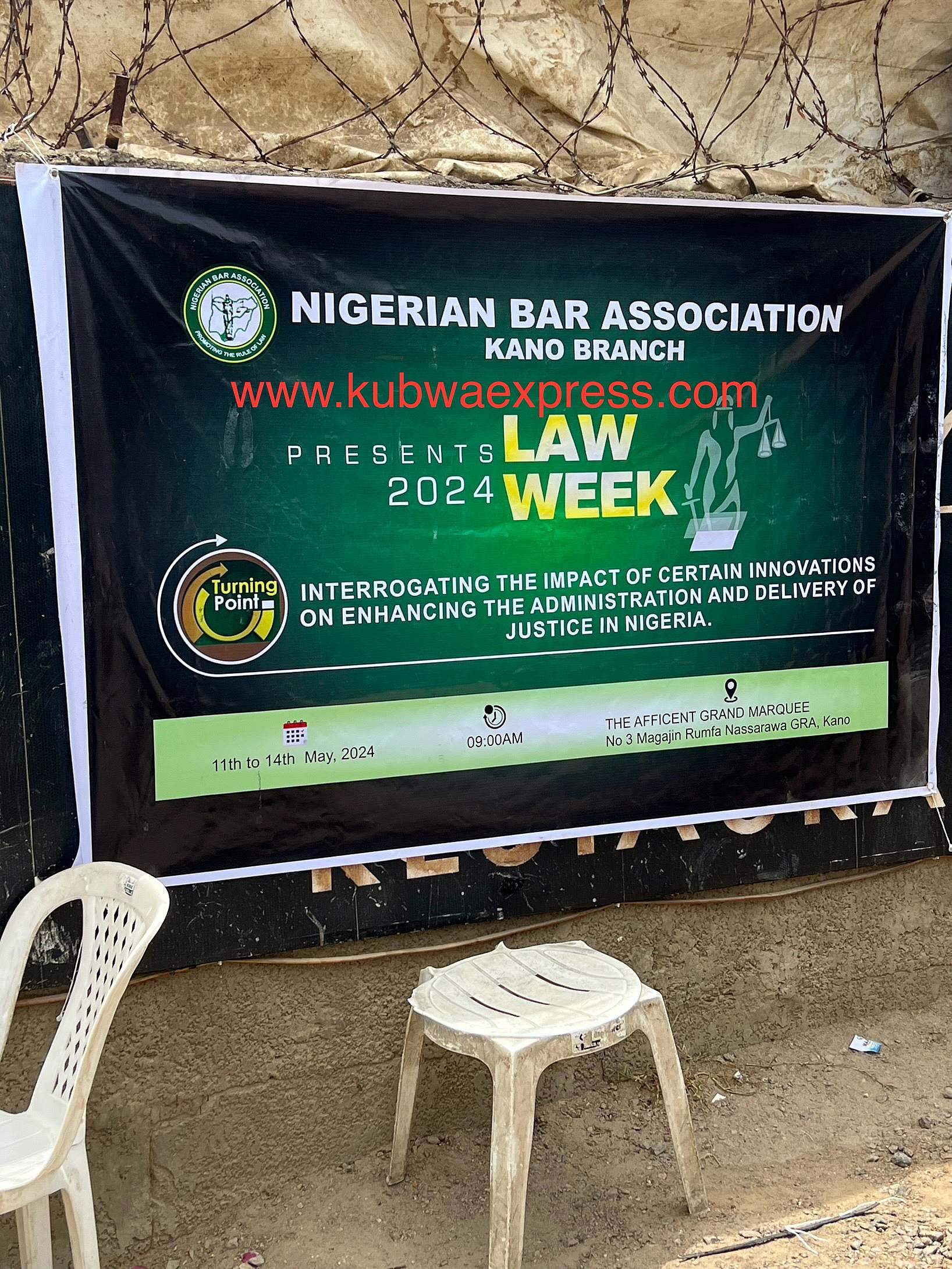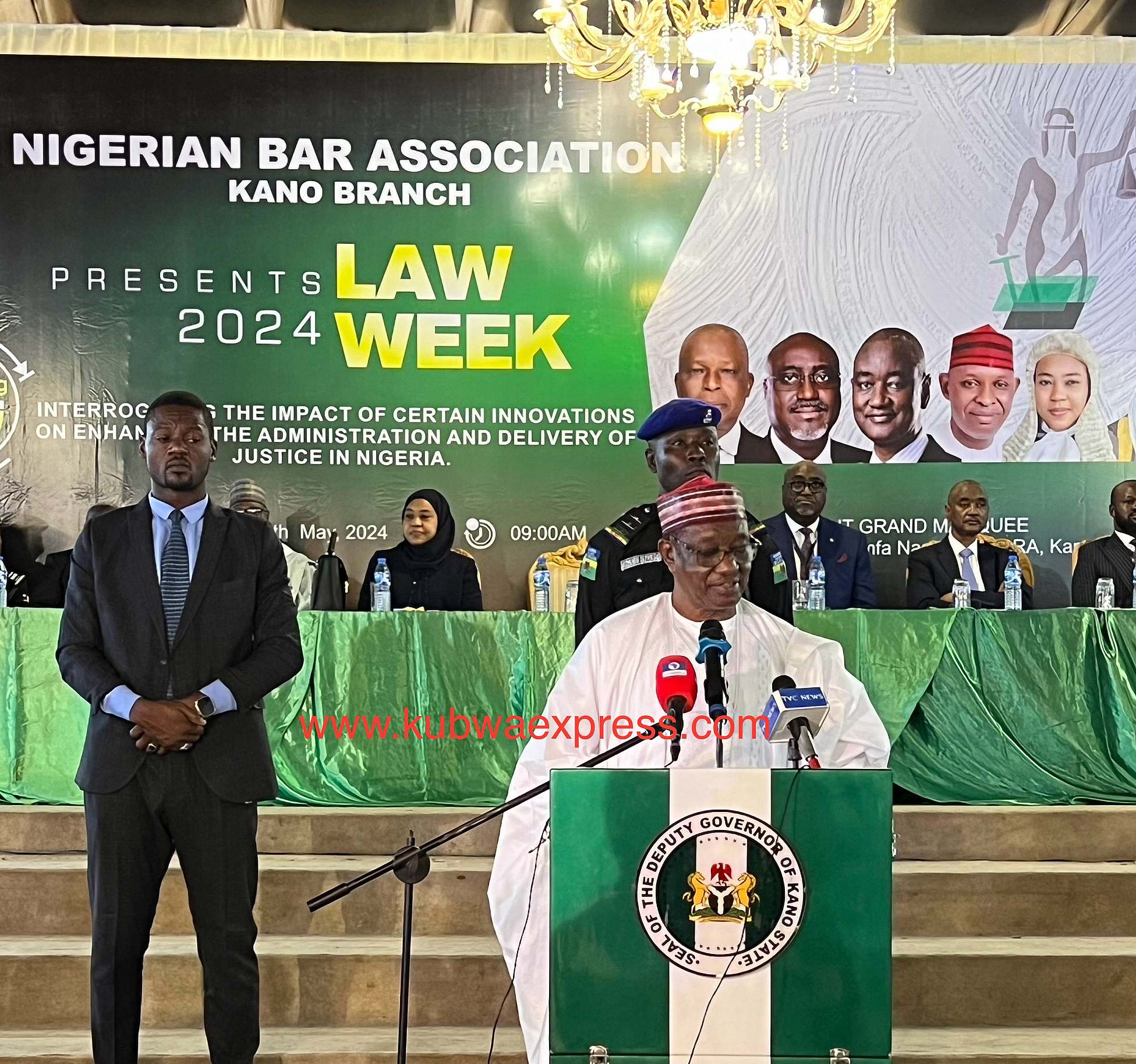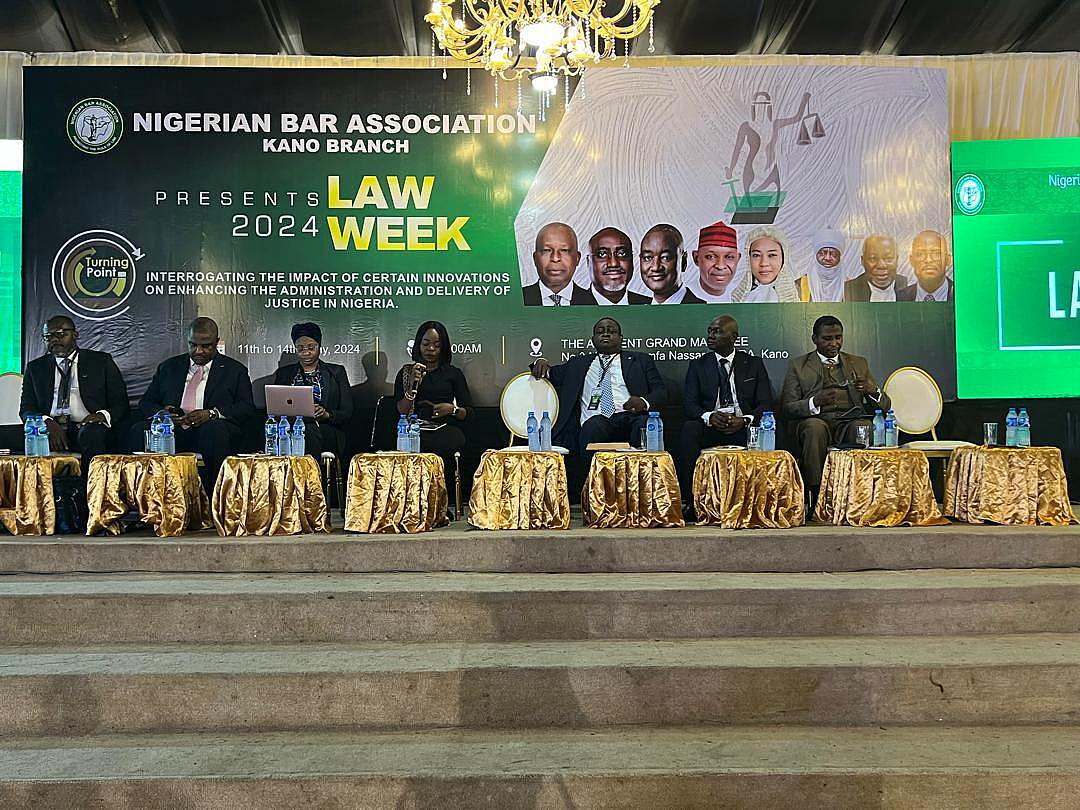Keynote Speech by A. B. Mahmoud, OON, SAN, FCIArb, (UK) at the Nigerian Bar Association, Kano Branch 2024 Law Week at the AfficentEvent Center on the May 13, 2024.
HE the Governor of Kano Stare, Alhaji Abba Kabir Yusuf.
My Lord, the Chief Judge of Kano State Hon. Justice Dije Abdu Aboki.
My Lord the Hon. Grand Kadi of Kano Qadi Tijjani Ibrahim Yakasai.
My Lords, Justices and Qadis of Kano and Jigawa States.
Hon. Attorney General of the Kano State and Commissioner of Justice.
His Royal Highness, Alhaji Aminu Ado Bayero, LLD, CFR, JP.
The President of Nigerian Bar Association Mr. Y.C. Maikyau, SAN.OON.
Chairmen, Nigerian Bar Association (Kano and Ungogo Branches)
Chief Registrar of the Kano State High Court. Benchers, Members of the Inner and Outer Bar.
Distinguished Colleagues, Ladies and Gentlemen. It is a great honour and privilege to be invited to deliver the Keynote address to the 2024 Law Week of the Kano Branch of the Nigerian Bar Association.

I join the Chairman of the Branch Mr. Sagir Gezawa to welcome our dignitaries to this opening ceremony.
I wish to welcome HEAbba Kabir Yusuf, the Governor of Kano State who is joining us for the first time since he assumed office. We are delighted at your presence, and we take this as a signal and mark of your administration’s commitment to the rule of law and support for the legal profession.
Let me begin by commending the leadership of the branch for sustaining the tempo of activities and the responsive and innovative leadership they have provided over the last two years, building upon the successes of their predecessors.
This is very commendable. I hope the new emerging successors will continue to build on the successes achieved.
When I was asked by the conference planning committee to give the keynote address, I was informed that the theme of the Law Week was “Turning Point”.
This was reflected in the way the Law Week was advertised. This, as many can imagine gives very little context as to the expectations of the organizers. The phrase itself is defined in different contexts. It has been defined as “a point at which a decisive change takes place” …’a point at which something changes direction’. It could also be a critical point of crisis.
The phrase says nothing about the direction of change or the role of any actors or players in bringing about the change. Indeed, as political scientists would argue, the direction of change at any given turning point in society will depend on the relative strength of the competing forces in society. A contest between progressive forces and the beneficiaries of the existing social order.
The theme “Turning Point’ nevertheless reminded me of the theme of 27th Nigerian Economic Summit organized by the Nigeria Economic Summit Group in October 2022. The theme for that year’s conference was “Securing our Future: The Fierce Urgency of Now”. It reflected the impatient expectation in the country for transformative reforms to chart a new direction amidst deepening social and economic crisis. The phrase is not an invention of the NESG. It has been used severally in the past. “The Fierce Urgency of Now: Lyndon Johnson, Congress and the Battle for the Great Society” is the title of a book written by Julian Emanuel Zelizer, a Prof of Political Science at Princeton University. The book chronicles President Johnson’s one term as president of the United States between 1962 and1966 during which he spearheaded what many consider the most transformative agenda in contemporary American history. He championed the passing of Civil Rights and Voting Rights Acts, the War on Poverty, Medicare and Medicaid amongst other progressive landmark initiatives. But perhaps a better-known usage of the phrase “The Fierce Urgency of Now” must be by Dr. Martin Luther King jnr. in his “I have a Dream” Speech of August 28, 1963. This was what he said: “We are now faced with the fact that tomorrow is today. We are confronted with the fierce urgency of now. In this unfolding conundrum of life and history, there ‘is’ such a thing as being too late. There is no time for apathy or complacency. This is a time for vigorous and positive action.”.
“Turning Point” resonates well with ‘The Fierce Urgency of Now”. For us in Nigeria, the conundrum we now face, whether it is the economic hardship, or in the pervasive insecurity, rising poverty, or the dysfunctional of state institutions including those of the justice sector, means we have reached a turning point. In the words of Martin Luther Kind Jnr. It is time for vigorous and positive action. Although often, when we thought we had reached a turning point, the country, lacking in transformative leadership, and with abundant complacent followers, sinks into deeper conundrum.
So, I commend the leadership of the branch for this brilliant choice of theme so appropriate for our law week, reminding us of the urgency of change and reforms.
May be in Gezawa or in Manhood Sanusi Yusuf or indeed in Huwaila, we have another Martin Luther King Jnr. in the making!
I must confess, my initial temptation was to take a much broader approach to the topic casting my inquiry into discernable trends or developments both global and national level and weave them into what I consider the justification for the imperative of vigorous and positive action that faces country and the legal profession. When we look broadly, the world is facing turbulent times, whether from the perspective of disruptive innovative technologies, or the crumbling world order, or the climate crisis or global warming and climate change.
At the national level, our country is facing deep and disturbing crises also. We can legitimately ask the question, is democracy really working? Is it delivering abetter life for our people? What we see all around us is deepening poverty, rising cost of living, unemployment amidst burgeoning restless youth population.
Our institutions, especially justice sector institutions, appear overwhelmed and unable to deliver on expectations of establishing the rule of law and protecting the citizens. Both from the global and national perspective, the law and the legal profession have the burden and an overriding responsibility of helping to define and negotiate a pathway for a better future.
However, on further reflection and after engagingthet Chairman of the Branch who later also pointed me to Mashood Sanusi Yusuf, one of the organizers, who sent in a useful concept note setting out the idea behind the choice of the theme “Turning Point: Interrogating the Impact of Certain Innovation on Enhancing the Administration and Delivery of Justice in Nigeria” I moderated my desire to embark on a broader interrogation and decided to keep closer to the script.
The short concept note correctly defines the phrase ‘turning point’ in part in line with my understanding. It, however, situates the problem in the context of what it refers to as “the wave of innovation and technological advancement and globalization” and the impact on the legal profession. It points to the potential application of technology to enhance efficiency in the administration of justice whilst noting its potential negative impact on legal ethics and etiquettes particularly in relation to the pervasive nature of social media.
What I propose to do therefore is to restrict my discussion to some of the key issues and conceptsaround the imperative of innovation and technological application in the to the administration of justice. It is important, at the onset, to state that though innovation and technology may frequently overlap, especially in recent years, they remain two different things. Innovation can be viewed as the process by which new ideas, methods, products, services, or solutions are brought about.
They are not necessarily major breakthroughs but will always bring about value addition. Organizations, especially in the private sector, deliberately seek to create suitable structures to support innovation and develop an innovation culture and this is seen as part of a long-term strategy for the growth, competitiveness, and sustainability of the organization. Some private law firms for instance are known to have created innovation hubs to encourage creativity and the development of innovative solutions in the delivery of legal services thereby enhancing client satisfaction and making them more competitive. We have also begun experimenting with our own innovation strategy in our law firm. Leaders in the public sector including the judiciary need to make innovation and development of innovation culture within their departments an important goal and indeed a priority.
Some private law firms for instance are known to have created innovation hubs to encourage creativity and the development of innovative solutions in the delivery of legal services thereby enhancing client satisfaction and making them more competitive. We have also begun experimenting with our own innovation strategy in our law firm. Leaders in the public sector including the judiciary need to make innovation and development of innovation culture within their departments an important goal and indeed a priority.
It is this mindset that will ultimately create a framework for receptive transformational ideas including the use of technology. Understandably, it is not easy in the context of the public service which often is beset with redtapism. But reform of the public sector institutions remains imperative in overcoming its current challenges.
Technology in the Administration of Justice and legal services Computing, Information Technology and the internet have emerged as some of the most defining features of the last few decades. The transformation occasioned have been phenomenal.
The impact cut across all spheres of human activity. Technology has changed the way we work and live. It has brought about connectivity beyond what only decades ago would have been unthinkable. Its impact in transport, aviation, healthcare, commerce, banking, access to information has been transformative.
Our notion of time and space has been completely changed. E-commerce for instance, removes barriers of time and space in commercial activities. As would be expected, the legal space, has not been spared. ICT has upturned much of the theoretical foundations on which legal precepts and norms have been developed over the centuries. These are now being redefined, whether in the law of contract, law of evidence or intellectual property rights.
The transformative impact of technology seems set to assume a new dimension. With the rapid developments of areas of robotics, artificial intelligence and machine learning, the debate is now on the table about a jobless future. That is a jobless society in which all work is carried out by robots. Many organizations are now genuinely concerned about the future of work. Artificial intelligence, whether in its basic form WEAK AI systems designed to carry out tasks or jobs such as in our personal assistants e.g. Apples’s Siri or STRONG AI which carry on human like tasks, often more efficiently e.g. self-driving cars etc. are generally becoming more sophisticated and super-efficient. It is often difficult to differentiate human capabilities.  Some AI Applications are now able to mimic human behavior and emotions, raising moral and ethical questions. Indeed, concerns are being raised around the possibility that AI could threaten human existence. For instance, if machines become too intelligent for humans to understand could they simply pursue their programmed goals, ultimately harming humanity?
Some AI Applications are now able to mimic human behavior and emotions, raising moral and ethical questions. Indeed, concerns are being raised around the possibility that AI could threaten human existence. For instance, if machines become too intelligent for humans to understand could they simply pursue their programmed goals, ultimately harming humanity?
Only last week, in Abuja, the Catholic Bishop’s Conference of Nigeria raised concerns about unregulated use of AI and warned that despite its enormous benefit for human development, yet it was fraught with real dangers to humanity.
These challenges notwithstanding, application of technology in legal services is generally a foregone conclusion. It is taking place exponentially. Amongst law firms the pace varies, usually depending on the size of the firm, resources available to it etc. Some firms have automated their process, document managementsystems, client engagements and billing. Many have access to digital legal resources from a variety of sources both local and international.
The pace is exponential. Some of you here may recall when in 2017 in a bid to encourage digitization of our practice, we distributed year handheld devices pre-loaded with law reports and other legal resources free of charge to all registrants at our Annual General Conference of that year in our bid to popularize the use of technology and digital legal resources. Some of our colleagues questioned our initiative.
The frontiers I believe have advanced since then. I think most lawyers will now have access to the internet in their offices and will use some devices and have access to some database or other legal resources. It is in the courts that the process is perhaps much slower. Some states notably, Borno, Lagos and a few others have made significant progress. Many courts will have some infrastructure even if insufficient.
It is in the courts that the process is perhaps much slower. Some states notably, Borno, Lagos and a few others have made significant progress. Many courts will have some infrastructure even if insufficient.
Be that as it may, the current thinking is that technology is a necessary tool in the administration of justice. In his report to the General Assembly of the United Nations 14 July 2023, on “Strengthening and coordinating United Rule of Law Activities’ The UN Secretary General called on member states attention to the need for “using technology to advance access to justice for all”. The report identifies some of the advantages and challenges as follows: “Digital technologies provide new means for people to build more inclusive and accountable institutions that, when properly designed, can respond to the needs of people and communities, in particular the most vulnerable.
Digitalization can advance access to justice by creating easy, inclusive, and accessible filing or complaint mechanisms and processes for those with internet access. It can also contribute to better understanding of response to justice gaps by providing data and statistics.
E-filing, digital case management virtual courts on mobile applications are good examples of digital adaptation enhancing access to justice, in particular for vulnerable groups, if applied in appropriate situations and with the necessary safeguards.
The Unted Nations is leveraging this potential and actively supporting countries in their path to digitalization while providing guidance to ensure that human rights and data privacyprotection plate applied along the way.Equal access to justice for all requires a recognition of the inequalities andobstacles as well as enablers at all stages of the justice process in which technology plays a role.” The challenge in Nigeria in my view is that we are still lacking in coherent policy guidance on the application of technology in our courts. And also, there is a lack of provision of sufficient resources. Much of the investment is procurement driven, not based on needs assessment or well-informed decision on appropriate or suitable technologies. The technologies are often not harmonized amongst the various courts to facilitate exchange of information or data. Vendors in many cases dump devices on the courts, some of which are hardly used but simply decorate the offices. There is also insufficient training of staff and judges. Changes brought about by new technology in the workplace require intense preparation and reorientation. Success often requires culture transformation. Often this is lacking.
The challenge in Nigeria in my view is that we are still lacking in coherent policy guidance on the application of technology in our courts. And also, there is a lack of provision of sufficient resources. Much of the investment is procurement driven, not based on needs assessment or well-informed decision on appropriate or suitable technologies. The technologies are often not harmonized amongst the various courts to facilitate exchange of information or data. Vendors in many cases dump devices on the courts, some of which are hardly used but simply decorate the offices. There is also insufficient training of staff and judges. Changes brought about by new technology in the workplace require intense preparation and reorientation. Success often requires culture transformation. Often this is lacking.
The courts also lack sufficient structures to consistently drive this transformation. Migrating from manual operations to automated operations or digital platforms requires expertise and appropriate skills.
Our courts lack the requisite manpower to drive the use of technology in the court rooms. Whilst we have Directors of Litigation, or Director orProcess, how many courts have Department orDirector of Information Technology or Digital Transformation to oversee the implementation of digital justice delivery.
Sometimes what we see is that judges who are more technologically prepared tend to drive the process in their individual court rooms themselves, often with their own private resources. This should not be the case.
Technology and the administration of civil and criminal justice.
It is important to understand that aside from application of technology for operational efficiencies that are normally achieved through such applications as e-filing, scheduling, case management, document management, technology in the administration of justice could be in the context of substantive justice delivery. For instance, when a court holds virtual hearings or remote proceed in , specific implications could arise in relation for instance to special rights enshrined in the statutes or even in the constitution. The impact of these could vary differently in civil and criminal justice administration.
In civil justice, the challenges are perhaps less profound. Some courts have adopted remote hearings for urgent and non-contentious proceedings. Indeed, many courts both trial and appellate now conduct some aspects of their proceedings virtually. Appellate courts nowadays, taking advantage of their new rules hear appeals virtually or deliver judgments virtually. Just last week, our firm filed an urgent action at the Federal High Court here in Kano.  I was planning to get on the next flight from Abuja to appear in court to move an exparte application when to my great relief and surprise, the Judge simply directed the Registrar to send a link for virtual sitting. I joined from Abuja, other counsel joined from Kano and the proceedings took place hours after filing.
I was planning to get on the next flight from Abuja to appear in court to move an exparte application when to my great relief and surprise, the Judge simply directed the Registrar to send a link for virtual sitting. I joined from Abuja, other counsel joined from Kano and the proceedings took place hours after filing.
We see also the emergence of Online Dispute Resolution systems in many countries. This emerging trend received a great boost following the Covid-19 Pandemic. ODR is defined as “a mechanism for resolving disputes through electronic communications and other information and communication technology” It allows parties to resolve their disputes without the need to meet in a physical space thereby removing geographical barriers and minimizing costs.

In the area of criminal justice, technology mediation has raised a lot of concerns amongst scholars and human rights lawyers. Scholars point to the fact that technological developments far outpace the study on the effects of technology and therefore caution against rapid implementation of the technological innovations. Some scholarspoint to what is referred to as the ‘digital divide’ or the unequal access to digital skills and internet access and that technology is not gender neutral and therefore conclude that ‘digitally mediated justice will not automatically guarantee access to justice for all’.
In many countries, technology application is now pervasive amongst all justice sector institutions. These include the police that use various forms and applications including robotics and AI and use algorithms to determine investigative activities and deployment of policing resources. We also see the use of facial recognition as a means of identifying suspects. In prisons, various forms of technology and digital means are deployed to monitor and patrol prisons ostensibly tocreate safer prison environments. However, in some countries, technology has been used to deliver learning activities for the benefit of inmates. These include self-paced learning modules etc.
An innovative use of technology to improve the lives of inmates is the case of Changehubin Langata Women’s prison in Nairobi, Kenya. It is an Innovation Centre that is technology focused on rehabilitation of women inmates. It teaches women coding, web design, computer hardware maintenance and 3D printing. Change hub is reported to have trained several women prisoners who have been very successful after leaving prison. Clearly, the application of technology in penal institutions as indeed other justice sector institutions could have positive impact but also very serious negative consequences.

Some of the issues that have assumed a new currency because of development in field of ICT include concerns about privacy, data protection, data sovereignty, cybersecurity etc. As it is to be expected, especially in developing countries like Nigeria, the law is continually lagging the technological developments. Law makers and regulators are often many steps behind.
An aspect of technological development that is often lost to us in the developing world is the pervasive dominance of the developed world in this sphere and the implication of that. Much of the infrastructure and applications in use are created and owned by technology companies whose ownership is dominated by Western companies. Out of the 10 leading global Technology giant companies, 7 are US based. Microsoft alone has a market capitalization of $3.08 Trillion.
This is almost the equivalent to the total gross domestic product of all African Countries Combined which stands at $3.1Trillion. Nigeria’s GDP according to the World Bank 2022 was $472.62 Billion. But this is just an aspect of the story. Combine the activities of Google, Apple, Amazon Meta Platforms (Facebook, WhatsApp) etc., you will then begin to appreciate the far-reaching impact of the ownership of the technology and the implication for developing countries.
These top tech giants are now the largest investors in AI research and are set to dominate the landscape. There is now a technology dependency relationship that is emerging between the developed and the developing world which perhaps may be more cynical than colonization. Whilst this remains a matter of concern, it is obvious that technology will continue to make inroads into every sphere of our lives including the Justice Sector.
What is required in my view is that developing countries must begin to think deeply about this dependency relationship. We must invest in knowledge creation and create our own tech ecosystem that allows us to remain within the global ecosystem but does not perpetuate our dependency.
Let me conclude my address by speaking briefly to the issue of legal profession and social media. Associated with the technology and its various applications is the rising influence of social media. With devices within easy reach and access to the internet, social media has become a veritable tool in the legal profession.
However, it also has potential serious negative implications. It provides easy instant and effective means of communication with wide range of audience giving lawyers visibility and information and resources that may otherwise not be readily available. The real challenge is how do we ensure that social media conduct of members of the legal profession conforms to rules of professional conduct and in line with the dignity of the profession?
Rule 39 of the Rules of Professional Conduct for Legal Practitioners 2023 sets out in sufficient detail the framework of acceptable advertisement by lawyers. Yet it is doubtful if this sufficiently deals with the various risks involved in the use of social media.  I am not aware that the NBA has published any guidelines similar to those of the IBA International Principles on Social Media Conduct for the Legal Profession adopted in May 2014. This followed the work of the Legal Projects Team (IBA LPT) and its published report entitled: “The Impact of Online Social Networking on the Legal Profession and Practice”. Given the rising pervasive impact of social media and the risks posed to the reputation and integrity of the profession, the NBA needs to look more closely at this and perhaps at least articulate the acceptable standards of behavior or conduct by members of the profession on social media.
I am not aware that the NBA has published any guidelines similar to those of the IBA International Principles on Social Media Conduct for the Legal Profession adopted in May 2014. This followed the work of the Legal Projects Team (IBA LPT) and its published report entitled: “The Impact of Online Social Networking on the Legal Profession and Practice”. Given the rising pervasive impact of social media and the risks posed to the reputation and integrity of the profession, the NBA needs to look more closely at this and perhaps at least articulate the acceptable standards of behavior or conduct by members of the profession on social media. Your Excellency, My Lords, colleagues, distinguished ladies, and gentlemen, my address is intended to tease out some broad issues around the theme of the Law Week. I am sure we are going to dig deeper into the various issues in our working sessions over the next two days. I wish us successful week ahead. I thank you all for listening and I also thank the organizers for granting me this opportunity and privilege.
Your Excellency, My Lords, colleagues, distinguished ladies, and gentlemen, my address is intended to tease out some broad issues around the theme of the Law Week. I am sure we are going to dig deeper into the various issues in our working sessions over the next two days. I wish us successful week ahead. I thank you all for listening and I also thank the organizers for granting me this opportunity and privilege.
Dated at Kano, this 13th Day of May 2024.




